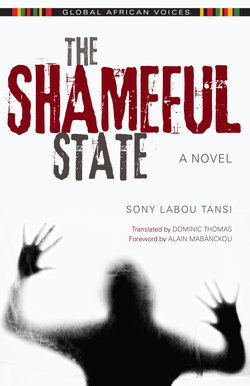Читать книгу The Shameful State - Sony Labou Tansi - Страница 6
На сайте Литреса книга снята с продажи.
ОглавлениеFOREWORD
THE SHAMEFUL STATE OR THE PORTRAIT OF THE AFRICAN MONARCH
Alain Mabanckou
Sony Labou Tansi (1947–1995) is widely acknowledged as one of Africa’s most talented authors. Although he died at a relatively young age, the singularity, creativity, and pioneering qualities of his novels and plays shaped a generation of literary production and continue to influence contemporary African literature. A cursory glance at the work of such important writers as Kossi Efoui (Togo) or Koffi Kwahulé (Ivory Coast), both of whom have also published novels and plays, reveals traces of this inspiration. Sony Labou Tansi’s creative energy was channeled in multiple directions, at times toward the Rocadu Zulu Theatre Company which he founded in the early 1980s, at others toward the six novels he wrote, all of which were published by the prestigious Éditions du Seuil.
Sony Labou Tansi burst onto the French and francophone literary scene in 1979 with his novel La Vie et demie (Life and a Half, IUP), featuring the emblematic figure of the immortal rebel Martial before whom the relentless efforts of the ruthless postcolonial dictator to liquidate him prove futile. This marked a significant turning point in francophone sub-Saharan African literature in a more general manner, bolstering the importance of the African dictatorship novel. Sony Labou Tansi’s political commitment and oppositional nature were the source of constant difficulties with the authorities, but also afforded him tremendous respect and the opportunity to engage with audiences in Africa and beyond that listened attentively to his words.
In his next novel, L’État honteux (The Shameful State), published in 1981, the figure of the rebel is eclipsed by the dictator, the despot, the African monarch, whose name is Colonel Martillimi Lopez. One day, all his ministers seek private audiences and hand in, one after the other, their letters of resignation, because they can no longer bear the idea of leaving “the country to the children of the children of our children” in this “shameful state.” The nation is on its knees, and they don’t want to be blamed. The irony is palpable in this unusual turn of events in which the very people who had the most benefitted from the power structure now become conscious of the country’s collapse, after having enriched themselves and enjoyed its spoils while the masses languished in poverty. The political situation at the time is of course relevant, and observers were quick to equate the central protagonist in this novel with real-life megalomaniacs such as Mobutu Sese Seko, whose dictatorial rule over Zaire for more than thirty years was characterized by embezzlement, corruption, and widespread human rights violations.
Following in the footsteps of such Latin American greats as Gabriel García Márquez and Mario Vargas Llosa, Sony Labou Tansi applied himself to the task of describing the most salient traits of political intolerance, to exposing the arbitrariness and whims of a monarch, while also highlighting the absurd nature of dictatorial rule. The Shameful State offers readers a historical insight into a grotesque and bloodthirsty monarch whose appetite for power proves insatiable. His degenerate behavior is comical, excessive, and ludicrous, but also tragic and apocalyptic when one takes into account the fact that so many African leaders, such as President Gnassingbé Eyadema (Togo), Field Marshal Idi Amin Dada (Uganda), and the self-crowned emperor Jean-Bédel Bokassa (Central African Republic), all closely resemble Martillimi Lopez. In The Shameful State, Sony Labou Tansi provides an inventory of the eccentricities of a leader whose acts of sexual debauchery prove to be limitless and who governs exclusively by responding to the urges of his “big herniated greasy balls.” Extrajudicial killings, murders, and imprisonment without due process are simply the order of the day.
The Shameful State was written at one of the most tumultuous moments in the history of the African continent. However, over time, this magisterial novel has lost nothing of its innovative merits and initial appeal and remains relevant to a range of political and social realities of the twenty-first century. Sony Labou Tansi has made it possible for us not only to understand better the complexity of Africa and the world today and the incessant ethnic conflict and competition for power, but also to reckon with the latest incarnation of the dictator-monarch who now exercises power in more discrete and discernible ways, perhaps because they too have read The Shameful State . . .
